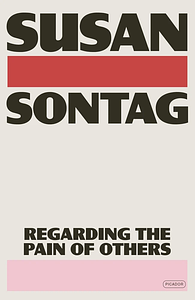Take a photo of a barcode or cover
An excellent follow up to Sontag's own On Photography that proposes how photography can encourage an examination of narratives and questions the assumed objectivity of this art/documentarian form.
This is a short read. I only got through half of it, however, and although it was well written, i feel like the content is old news. It was written in 2003, and since then, i feel like i've read a lot about the exaggerated use of violent images in the media. I don't really need to read anymore to get the gist of the point.
deeply revelatory, incredibly smart, and brilliantly articulated. all around impressive read
It feels a little dated, and I do wonder if her feelings would have changed with the US's recent use of torture and the release (and withholding) of its documentation. Her argument seems to be that images are simply not enough, do not provide enough context, and are too often used simply to provoke and shock -- but it all feels a little 19th century for my taste, and such criticism can be applied to all representations, especially of suffering and pain. While I have yet to articulate my own position on looking at photographs of violence or atrocities (and most often, I personally choose not to), Sontag's belief in photography's failure as a document seems to dismiss the way in which it can remind us of our own vulnerability -- and hopefully, with it, evoke empathy. Even if photography can be and often is manipulative, fabricated, etc, it doesn't seem like reason enough to not have, ask for or demand access to such images, regardless of our own personal preferences of looking.
informative
reflective
slow-paced
Sontag makes a slew of arguments about war photography, our reactions to war photography, the inherent privilege in pondering the ethics of war photography, etc. and I think it’ll take me a few reads to figure out what she was really trying to say. My mind is spinning!
The last two chapters are so good, that I finally got into the flow with the book's writings. The visual analysis and the antiwar photographic work at the very end are superb. Highly recommend both for the detailed descriptions and strong (moral) argument.
dark
emotional
informative
reflective
This is by far the best nonfiction I have ever read and I think everyone should read this at least once in their life.
informative
reflective
dark
informative
reflective
medium-paced





